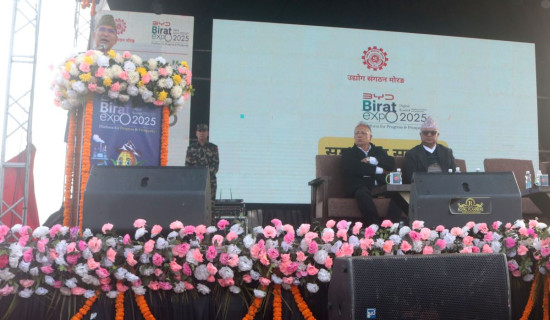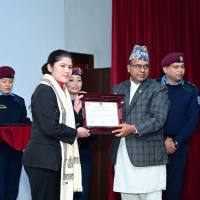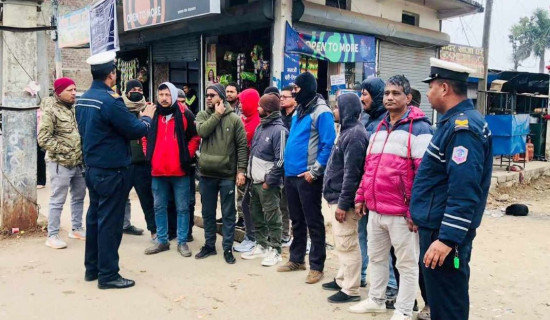- Sunday, 26 January 2025
59thAnniversary Special Supplement
An Unceasing Quest For One Good Sentence
Polonius: "What do you read, my lord?"
Hamlet: "Words, words, words"
–Hamlet, Act II, Scene ii.
This fragment of dialogue from Hamlet by William Shakespeare aptly sums up my professional engagement with The Rising Nepal (TRN), the oldest broadsheet English daily in the country. I heard of TRN for the first time during my school days in Biratnagar in the mid-1980s through My English textbook. We had to draft a letter to the editor, and TRN was the only English newspaper in those days.
However, I never thought I would work for the newspaper one day. As a naïve young boy from the eastern hills, I had been stung by the bug of English, and I wished to acquire higher education in English and work as a university lecturer. This is also because I was rather poor with numbers, though considered a diligent student with an ability to pursue Science instead of Humanities.
Obviously, my wish prevailed, and I joined Humanities with English as my major. But though I was proficient in English grammar, literature turned out to be a totally strange terrain; grasping the meanings of poems by John Milton or John Keats and plays and stories by George Bernard Shaw and Somerset Maugham, among others, proved to be daunting. But since I had jumped into the world of literature, it was up to me to swim or sink, and I learnt to stay afloat by and by.
In the early 1990s, during my undergraduate days, I worked as a teacher at Galaxy Public School in Kathmandu, where I came to know Prakash Rimal, who later joined and worked for The Rising Nepal. In the second half of that decade, when I had completed my MA in English, I got a message from him to work for the TRN. I readily accepted the offer.
After working for a couple of months, we sat for the tests, and I got appointed as Assistant Editor of the daily.
Early years
Though I could write correct English, I didn’t know the ABCs (accuracy, balance and credibility) of journalism. The first few months, I mainly translated the press statements that landed in the office before gradually learning the ropes of journalism. My mentors told me that a good news story answers five Ws (what, who, when, where, why) and one H, meaning how. I learnt about the dateline, or where the story originates, and the deadline, or the time to complete and submit the story; I came to know about the lead, or the opening sentence or paragraph of the news report, and the headline, or the title. They said the structure of a news report resembles an inverted pyramid, meaning the most important information should come first. They asked me to write short and simple sentences and said the headlines should be catchy and generate interest in readers.
I covered business and economy for several years. But I concede that I was not a star reporter of The Rising Nepal, only an average one. There were far better reporters who have gone on to become successful professionals in the respective fields of their pursuit. In fact, I was a half-hearted journalist and was also working as a lecturer in private colleges in those days; journalism somehow didn’t pull me as strongly as teaching English did. That obviously had repercussions on my career as a journalist.
Mid-career days
As I became more proficient in the job, I was asked to coordinate the Friday Supplement of the daily. Now my responsibility was to edit feature articles on diverse subjects, put appropriate headlines, find suitable photos to accompany them and package all the matter in attractive design. So I gradually increased my exposure to newspapers and magazines from home and abroad, including The Economist and The New York Times, so as to enhance my skills in language and design. I loved The Economist (I still do) for its compact reporting and analysis, but what I liked most about the magazine were the headlines. They mostly referred to the wide world of literature and were so subtle that they made you chuckle and think at the same time. Then I began to understand what master storytellers like Ernest Hemingway and Kurt Vonnegut said about writing and editing. Hemingway has said, “Do not worry. You have always written before, and you will write now. All you have to do is write one true sentence.”
I read the New York Times for the riveting narrative they wove to sustain readers’ attention. I had a chat with Bhadra Sharma, Kathmandu correspondent of the Times, who said they work in teams for months, sometimes even years, on some stories before they finally get printed. “We talk to many probable characters and focus on the ones that add the most value to the story.” Besides, the Times carried opinions by world-famous commentators on a wide range of subjects, not to mention powerful editorials on current affairs and other issues. No wonder, the newspaper has a global reputation and readership.
Alongside coordinating Friday, I also had to write editorials for the daily. And writing editorials was quite different from doing news reports or editing feature articles for the Supplement. Unlike them, editorials are written in a formal, official tone and should demonstrate finesse in terms of vocabulary and sentence structure. The task required intensive and extensive reading and proper planning and organisation. So whatever I read, I paid attention to how the words had been used and sentences formulated. I tried to use the new words in my own writing and made constant efforts to improve sentence structures and organisation of paragraphs. As the Nobel laureate Doris Lessing says in The Golden Notebook, “I play(ed) with words, hoping that some combination, even a chance combination, will say what I want.”
Latest times
Currently, I work as a copy editor of the daily. Naturally, my primary concern is to improve the news reports young reporters produce. While doing my job, I try to follow George Orwell’s ‘Six Rules of Writing’ laid out in his popular essay Politics and the English Language, particularly rules 2 and 3. He says, “Never use a long word where a short one will do” and “If it is possible to cut a word out, cut it out.”
Obviously, it may sound pretentious for me to cite these immortal literary figures and profess to work as per their guidelines, but that’s what I try to do as far as possible. I strive to craft one good sentence or one true sentence at a time. That’s been the essence of my job in the last two-and-a-half decades.
Did I earn name and fame working as a journalist with TRN? Obviously not, but that is beside the point. Over the years, I have realised, as Mother Teresa said, “Not all of us can do great things, but we can do small things with great love.” They say everyone has a gift, and our purpose in life is to share our gifts with others. Do I have any such gift to share? My friends and colleagues tell me that I can spot grammatical and factual errors quickly and can improve the quality of news reports and articles written by others. Maybe or maybe not, but it’s my conviction to do my bit in the best possible manner for the good old TRN that turned 60 today. Long live TRN!
(The author is a Deputy Executive Editor of this daily.)
















